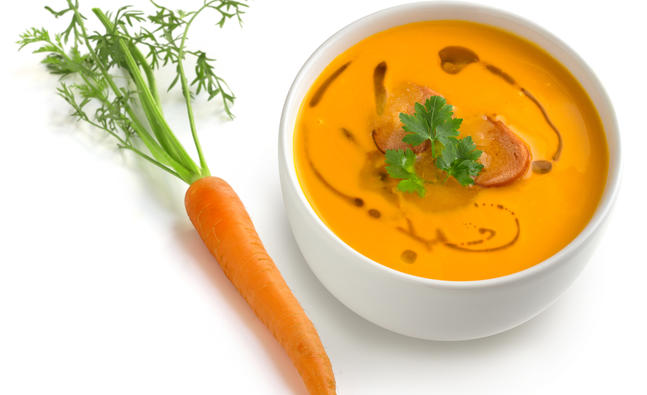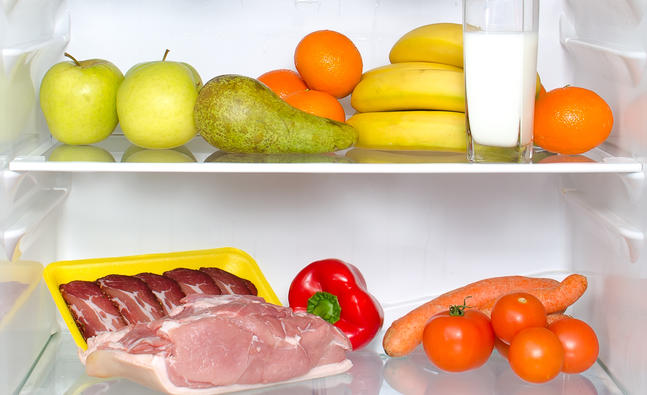Diet Myths That Are Making You Gain Weight
This article was republished with permission from POPSUGAR Fitness.
There are a lot of tips floating around out there about the best way to lose weight—so if you're following the wrong advice to a T, then the pounds may pile on instead of melting off. Time to separate fact from fiction so you can start seeing actual results.
Myth: Don't eat after 8 p.m.
Truth: What time you eat doesn't matter, but daily calorie intake does.
Despite popular belief, food you consume at night does not automatically get stored as fat—so giving yourself a cutoff time to stop eating is not going to help you slim down. The best way to drop pounds is to watch your calorie intake throughout the entire day without exceeding the number of calories that's right for you.
Research does show, however, that many women consume half their daily calories at or after dinner, and stress eating plays a huge role. Keep in mind that eating the wrong kinds of food at night—namely high-cal, high-fat eats—can affect digestion, making you toss and turn in bed. And not enough sleep can then cause you to overeat the next day. That's why some experts suggest eating most of your calories earlier in the day, with your biggest meal being at lunch, then consuming a lighter dinner. But if you know you like to nosh on a little something after dinner, save 150 to 200 calories for later. These dessert-style Greek yogurt recipes are perfect.
Myth: "Light" foods are better.
Truth: "Light" foods may contain fewer calories or fat, but not without increasing the sodium, sugar, chemical additives, or artificial sweeteners.
When you compare real cream cheese to the fat-free version, you may save 15 calories—but you gain 11 milligrams of sodium. It may not seem like much, but every little bit adds up, and too much sodium is a major cause of bloating. Not only that, but when people perceive a food as being light, they tend to eat more of it, consuming the same amount of calories or even more than if they had just gone with the original version.
It's best to avoid "light" and "fat-free" foods like cheese, chips, ice cream, and orange juice and go for the real deal; just choose smaller portions. The more natural the ingredients, the better.
Myth: You can eat all you want, as long as it's healthy.
Truth: Healthy foods still contain calories, sugar, sodium, and fat.
Whole-wheat bread and pasta, nuts and nut butters, avocado, dried fruits, oatmeal, fresh-pressed juices—all of these foods are healthy, but they're not void of calories. In fact, they're actually quite high; half an avocado is 161 calories, and 18 cashews are 163 calories. This means you can't mindlessly spoon into a jar of peanut butter just because it's good for you—one tablespoon will run you 105 calories. Counting calories and watching portions is still important, even when eating nutritious foods.
Myth: Going vegan automatically means weight loss.
Truth: Vegan foods can contain empty calories, too.
French fries, potato chips, dark chocolate, pasta, and homemade vegan Snickers—all of these foods are vegan, but if your diet is full of them, guess what? You definitely won't lose weight, and you just might end up gaining weight instead. Choosing to go vegan for the sole purpose of weight loss won't happen unless you eat a balanced diet containing lots of fruits, veggies, vegan protein sources (like beans and tofu), and whole grains. And be sure to keep track of calories.
Click HERE for six other diet myths that can cause weight gain from POPSUGAR Fitness!
-
10 TIPS ON HOW TO LOSE WEIGHT IN YOUR FACE
10 Tips on how to lose weight in your face Unfortunately, if y
-
5 Setbacks that hinder healthy results
-
The Meal Plan That Helped Cheryl Burke Lose 15 Pounds
Have you seen Cheryl Burke lately? The Dancing With the Stars favorite
-
The Marie Antoinette Diet
A new diet book, The Marie Antoinette Diet, claims that you can have y
-
Texting your way to weight loss
-
Follow the right fat loss strategies
- DON'T MISS
- 4 Reasons Why You’re Always So Damn Hungry
- The Type of TV Show or Movie That Will Make You Snack More
- Would You Use These Off-the-Wall Weight-Loss Gadgets?
- 5 Of our best high-protein (meat-free) recipes for WEIGHT LOSS
- 7 Reasons Fall Is A Great Time to Jumpstart Your Weight-Loss Goals
- Tons of Weight-Loss Ads Show Fake Before/After Photos: Report
- BEWARE! Dont be fooled by these diet-wrecking healthy foods
- Fall in love with Brussels sprouts this autumn
- Study IDs the Biggest Predictor of Obesity
- Are we poisoning ourselves with sugar?




